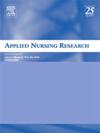The lived experiences of nurse practitioners during a nursing strike
IF 2.2
4区 医学
Q1 NURSING
引用次数: 0
Abstract
Objective
This study aims to understand the lived experiences of nurse practitioners (NPs) providing patient care during a nursing strike in a hospital setting.
Background
The nursing shortage afflicts the provision of health care. A recurring loss of seasoned nurses represents a loss of expertise and organizational knowledge, leading to internal burnout, inadequate resources, and recently, nursing strikes. Many strikes have occurred in health care, yet little is known about NPs experiences when caring for patients during nursing strikes.
Methods
A qualitative research design included personal interviews. Snowball sampling included identification of an initial key informant meeting inclusion criteria, followed by subsequent requests to refer other potentially eligible individuals.
Results
Interviews (n = 10) contained candid stories about primarily negative experiences creating moral and ethical dilemmas for NPs. Content analysis identified five themes: a) What do I do? b) We didn't know it was coming, c) COVID-19 caused it, d) It put our patients at risk, and e) I never want this to happen again. Experienced, older NPs tended to disagree with nursing strikes while younger, less experienced NPs expressed greater support of the strike.
Conclusions
Results call attention to NPs concerns while providing guidance for those preparing for these events. NPs experiences reflected moral and ethical dilemmas impacting patient care. Recommendations include integration of information via professional, educational programming to address these ethical and moral dilemmas. Incorporating a framework for management of ethical dilemmas and offering insights regarding expectations should one be required to practice during a nursing strike, is recommended.
护士从业者在护士罢工期间的生活经验。
目的:本研究旨在了解护士从业人员(NPs)在医院护理罢工期间提供病人护理的生活经验。背景:护理人员短缺困扰着医疗保健的提供。经验丰富的护士的反复流失代表着专业知识和组织知识的流失,导致内部倦怠,资源不足,以及最近的护士罢工。许多罢工发生在医疗保健领域,但很少有人知道护士在护理罢工期间照顾病人的经历。方法:采用质性研究设计,包括个人访谈。雪球抽样包括确定符合纳入标准的初始关键线人,随后要求推荐其他可能符合条件的个人。结果:访谈(n = 10)包含了主要是负面经历的坦率故事,这些经历给np带来了道德和伦理困境。内容分析确定了五个主题:a)我做什么?b)我们不知道它会来,c) COVID-19引起了它,d)它使我们的病人处于危险之中,e)我永远不希望这种情况再次发生。经验丰富、年长的护士倾向于不同意护士罢工,而年轻、经验不足的护士则对罢工表示更大的支持。结论:研究结果引起了人们对NPs问题的关注,同时也为那些准备这些事件的人提供了指导。NPs的经历反映了影响患者护理的道德和伦理困境。建议包括通过专业教育方案整合信息,以解决这些伦理和道德困境。建议将道德困境管理框架纳入其中,并提供有关期望的见解,如果需要在护理罢工期间进行实践。
本文章由计算机程序翻译,如有差异,请以英文原文为准。
求助全文
约1分钟内获得全文
求助全文
来源期刊

Applied Nursing Research
医学-护理
CiteScore
4.50
自引率
0.00%
发文量
65
审稿时长
70 days
期刊介绍:
Applied Nursing Research presents original, peer-reviewed research findings clearly and directly for clinical applications in all nursing specialties. Regular features include "Ask the Experts," research briefs, clinical methods, book reviews, news and announcements, and an editorial section. Applied Nursing Research covers such areas as pain management, patient education, discharge planning, nursing diagnosis, job stress in nursing, nursing influence on length of hospital stay, and nurse/physician collaboration.
 求助内容:
求助内容: 应助结果提醒方式:
应助结果提醒方式:


